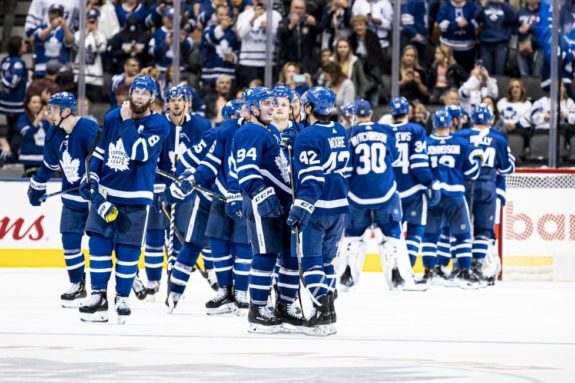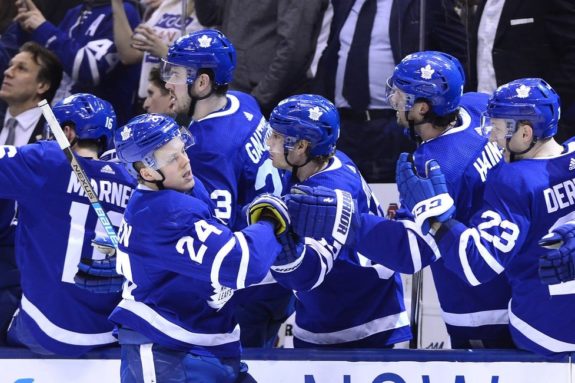
 Kevin Armstrong
The Hockey Writers
Kevin Armstrong
The Hockey Writers
18
Reads
0
Comments
Maple Leafs’ Offseason Advantages: Unfair Benefit or Model to Strive For
Few teams in sports polarize the fans the way the Toronto Maple Leafs do. In the NFL, it’s comparable to the New England Patriots. In MLB, it’s like the Houston Astros. You either love ’em or hate ’em. There’s another thing in common between these three franchises – bending some rules, and finding advantages. We know the Astros stole signs, and the Patriots have been caught recording other teams multiple times. The Leafs aren’t cheating, but the opposition says Toronto is walking a fine line. In the past month, the franchise has had to change its ways – twice.

On the second day of the Leafs training camp, there were four officials on the ice. Referees at camp are not entirely out of the ordinary. The head coach said they were part of every one of them he’s been involved to with Toronto. This camp is no different, says Sheldon Keefe, “I think it is important. We are trying to get up to speed, and game feel and intensity and all those things as quickly as possible.”
Related: Maple Leafs’ Forgotten Ones – Glen Wesley
However, one day later, the refs were gone. When asked about the officials’ disappearance, Keefe said, “apparently some people around the NHL are paying attention to our media reports here in Toronto. I think there were some people around the league that perhaps liked the idea that we had referees, but didn’t like the idea that maybe they didn’t have the same available to them.” Due to health restrictions and travel complications, other teams couldn’t find officials for training camp. Keefe played it off as no big deal and said the Leafs would adjust.
New Agreement Targets Toronto
Two days later, it came to light that there is a part in the extended Collective Bargaining Agreement that many believe is aimed at Toronto. Sportsnet’s Elliotte Friedman told SN590’s Leafs Hour that the elements on page 52 are “kinda targeted for Toronto.” He is referencing Attachment L, 15.11 (b) Prohibited Off-Season Activities. It states:
- Clubs are not permitted to have Club Coaching or Hockey Operations personnel (e.g., coaches, skating instructors, other Club employees, contracted service providers, etc.) who participate in any on-ice sessions with Players.
- Clubs are not permitted to request or encourage Players to come to the Club’s home city during the off-season to utilize the Club’s arena/training/practice facility(ies) and/or to train with Club Coaching or Hockey Operations personnel.
Friedman says the Leafs’ Ford Performance Centre is a popular spot for players to be during the offseason. “Toronto was a team that, a lot of their prospects, or a number of them, would come to Toronto in the summer. They’d work out at the practice facility, and they really improved as players. And teams were like we don’t like that, we think that is an advantage for Toronto, and we don’t want that to happen, so they shut that down.”

There are two ways to look at this situation. Toronto is working hard to find every advantage to improve its team and players. Other organizations should learn from the Leafs and look for ways to progress their programs. Or, Toronto has more money than other clubs and has an unfair advantage. It should remove all benefits that other teams don’t have or can’t afford.
Related: The WHA – A Look Back at the Upstart Hockey League
It’s an interesting debate. Should teams with money and resources be penalized? Is it really so bad that players can improve themselves in the offseason and improve the league overall? There’s the old aphorism that a rising tide lifts all boats. Perhaps the Leafs are providing that wave of change.
The post Maple Leafs’ Offseason Advantages: Unfair Benefit or Model to Strive For appeared first on The Hockey Writers.
Popular Articles

















































 Blackhawks Chicago
Blackhawks Chicago Panthers Florida
Panthers Florida Penguins Pittsburgh
Penguins Pittsburgh Rangers New York
Rangers New York Avalanche Colorado
Avalanche Colorado Kings Los Angeles
Kings Los Angeles Maple Leafs Toronto
Maple Leafs Toronto Bruins Boston
Bruins Boston Capitals Washington
Capitals Washington Flames Calgary
Flames Calgary Oilers Edmonton
Oilers Edmonton Golden Knights Vegas
Golden Knights Vegas Flyers Philadelphia
Flyers Philadelphia Senators Ottawa
Senators Ottawa Lightning Tampa Bay
Lightning Tampa Bay Red Wings Detroit
Red Wings Detroit Islanders New York
Islanders New York Sabres Buffalo
Sabres Buffalo Devils New Jersey
Devils New Jersey Hurricanes Carolina
Hurricanes Carolina Stars Dallas
Stars Dallas Jets Winnipeg
Jets Winnipeg Blue Jackets Columbus
Blue Jackets Columbus Predators Nashville
Predators Nashville Wild Minnesota
Wild Minnesota Blues St. Louis
Blues St. Louis Mammoth Utah
Mammoth Utah Ducks Anaheim
Ducks Anaheim Sharks San Jose
Sharks San Jose Canucks Vancouver
Canucks Vancouver


